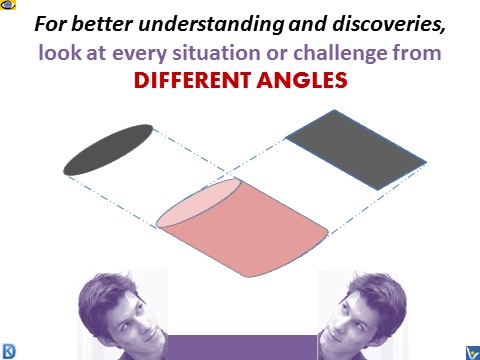|

→
Creative Problem Solving
Perceptions Rule Our Life
and Business
How we generate information about the world is
perceiving.
Our
→
life
and
→
business –
→
decision making ,
→
communication,
→
negotiation,
→
leadership,
→
teamwork,
→
motivation,
→
value
innovation,
→
differentiation,
→
marketing, etc. – is all about perceptions. The essence of
leading,
→
managing and
→
selling is coming to grips with people's
perceptions.
Idea Evaluation:
4x2 Perceptual Positions
→
Smart & Fast
Decision Maker
Perceptual positions
can help you gain new understanding through seeing things from different
perspectives...
More
References: 1.
"Making Better Business Decisions," Steve W. Williams |
→
Same Reality,
Different Perceptions
Most of your judgments result from decisional
shortcuts you use to generate solutions that are good enough most of the
time. When you perceive a situation that looks familiar to you, doesn't your
past experience cause you to see the event in terms of what you expect?
Doesn't your limited span of attention lead you to categorize things by
aspects that appear similar to what you already know?
"We are constantly bombarded with so much
sensory information that it is impossible for us to pay attention to
everything. Our
→
subconscious
mind scans our environment and selects what it
deems may be important for us to notice. Even then, people not only see
things the way they are, they also tend to see what they expect to see, as
well as what they want to see."1
→
Cultural Differences
→
Understand
EGA of Your Audience
→
4 NLP Perceptual Positions
"Much of human perception is
based not on information flowing into the brain from the outside world but
what the brain, based on previous experience, expects to happen next,” says
Sandra Blakeslee.
 Young Women or Old Woman? Young Women or Old Woman?
Beauty...
Truths... Everything is in the eye of the beholder...
This example is often used by educators when
they talk about
selective perceptions. Take a look at the
Image 1 of a woman. How would you describe her? Is she young or old?
Pretty or unattractive? Rich or poor? You must have classified her as young,
pretty, and wealthy. Now look at the
Image 2. Have you change your mind? Unlikely. You still see a young,
pretty, and wealthy woman. And what if I tell you that she is old,
unattractive and poor? You won't believe me.
However, people who are initially shown the
woman in
Image 3 and then are asked to describe the woman in
Image 2 almost always say she is old, unattractive, and poor, i.e. they
see the opposite of what others see in the very same picture. "When shown
either the relatively unambiguous picture of the young or old woman first
(Figure 1 and 3) and than the composite picture (Figure 2), selective
perception has been triggered. Exposure to either picture draws our
attention to seek out thinking processes willingly oblige by conforming that
the second picture lives up to our expectations."1
"The state of your
life is nothing more than
a reflection of your state of mind."
~ Wayne W. Dyer
|